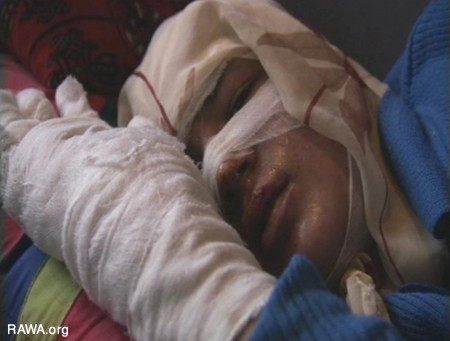By SUDABAH AFZALI
HERAT, Afghanistan -- Only someone living in Afghanistan would consider Iran a bastion of freedom and independence for women.
But authorities here say such a perception may be what's behind a soaring number of suicides in this western province. Once exposed to Iran's relatively more sophisticated society, women who return to Afghanistan are unable to survive in this restrictive society.

Dr. Sayed Naim Alemi, director of the regional hospital in Herat, said that there have been 85 cases of attempted suicide at his hospital alone over the past six months, double the number from previous years. Of those, 57 women succeeded in taking their own lives.
More Photos
That was certainly the case for Mahjabin, 23, who weeps softly as she describes what led her to attempt suicide by swallowing rat poison.
She described how she and her family returned to Afghanistan five years ago after spending several years in Iran. Once back, she said, her father forced her into a marriage.
"My family sold me to that man, and married me off to him for money," she said.
Her new husband, who already had one wife, was anxious that she produce him a child. But when she failed to become pregnant after one year, she said, the abuse began.
"My mother-in-law would fight with me every day," she said. "She would ask me sarcastically why I hadn't had a baby. She would say she was going to find another woman for her son. My husband also treated me with anger." The young woman felt she had nowhere to turn.
"My family wouldn't support me. I thought that if I went to the authorities, no one would listen to me. I was disappointed on all sides. So I decided to end my life of suffering by taking rat poison," she said.
Dr. Sayed Naim Alemi, director of the regional hospital in Herat, said that there have been 85 cases of attempted suicide at his hospital alone over the past six months, double the number from previous years. Of those, 57 women succeeded in taking their own lives.
The most common method, Alemi said, was for women to douse themselves with kerosene and then set themselves on fire, although some chose poison.
And most suicide attempts involved women recently returned from living in Iran, he confirmed.
"In Afghanistan, particularly around Herat, women are considered chattels to be sold," he said.
Mohammad Dawud Monir, an expert on social and legal affairs in Herat, said he was not surprised by the situation.
"Large numbers of people left Herat for Iran over the past 30 years and enjoyed a comparatively better life there, he said. "To some extent, they were exposed to technology and civilization. The women saw the prosperity and rights enjoyed by Iranian women. When they returned, they faced unemployment, poverty and traditional societal restrictions."
Observers say that in Afghanistan's traditional, male-dominated society, violence against women, combined with the absence of rule of law, mean those who face such pressures have no way out and often turn to suicide.
Hamida Husseini, the director of the cultural department of the government directorate for women's affairs in Herat, said her agency was planning to take a number of steps to address the problem.
She said her agency, along with a number of women's groups, planned to boost public awareness of the problem and lobby for punishment for those who commit violence against women.
She also said she planned to initiate an outreach program that would send teams out to talk to young mothers and girls about their lives and daily problems. That way, said Husseini, her department can gain a more accurate picture of the situation and will thus be better able to support vulnerable families.
"Older women will be hired for this program," she said, "because they have some experience and can create good relationships with women and girls, ask about their problems and keep in touch in the long term." For some like Shokria, however, such steps will come too late.
The 28-year-old suffered burns over 80 percent of her body after setting herself on fire. Doctors doubt she will survive.
Forced into an abusive marriage by her family, Shokria said she decided on suicide when she could no longer endure the daily beatings her husband meted out to her and her children.
"I don't regret setting myself on fire," she said. "My only concern is that my children will still be with that cruel man."



